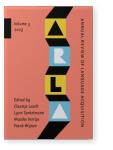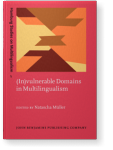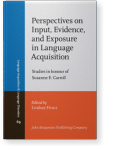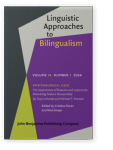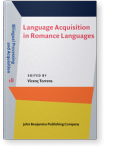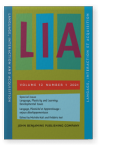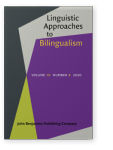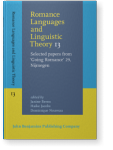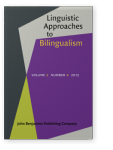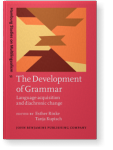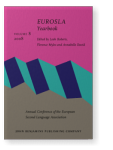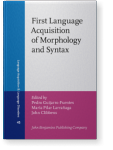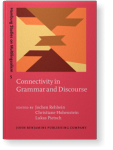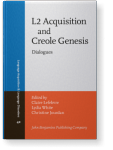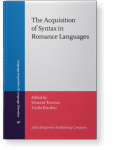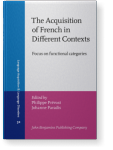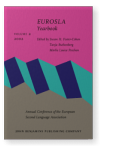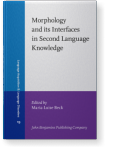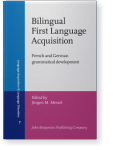Natascha Müller
List of John Benjamins publications for which Natascha Müller plays a role.
Yearbook
Title
(In)vulnerable Domains in Multilingualism
Edited by Natascha Müller
[Hamburg Studies on Multilingualism, 1] 2003. xiv, 374 pp.
Subjects Cognition and language | Generative linguistics | Language acquisition | Multilingualism
2024 Chapter 3. Acquisition of morpho-syntactic features in a bilingual Italian child: An integrated approach to gender Perspectives on Input, Evidence, and Exposure in Language Acquisition: Studies in honour of Susanne E. Carroll, Hracs, Lindsay (ed.), pp. 54–87 | Chapter
The present study investigates the interaction of gender with (declension) class in the acquisition data of one bilingual child (from two to five years old) who develops Italian as a weak language in combination with German in Germany. As reported in the literature, the Italian child acquires… read more
2024 From the child’s perspective Epistemological issue: The importance of features and exponents: Dissolving Feature Reassembly, Flores, Cristina and Neal Snape (eds.), pp. 90–95 | Commentary
2024 Chapter 5. Parameter setting in multilingual children with special reference to acceleration in French Language Acquisition in Romance Languages, Torrens, Vicenç (ed.), pp. 114–143 | Chapter
Linguistic theorizing has revised the switch metaphor of parameters as being part of Universal Grammar. Within an epigenetic approach to language (Biberauer et al., 2014; Roberts, 2019), parameters result from the interaction of innate (linguistic) knowledge and universal non-language-specific… read more
2021 Parameter setting and acceleration: Subject omissions in a trilingual child with special reference to French Language, Plasticity and Learning: Developmental Issues: Langage, Plasticité et Apprentissage : enjeux développementaux, Kail, Michèle and Frédéric Isel (eds.), pp. 157–184 | Article
The present contribution analyzes the acquisition of subjects in French based on a longitudinal case study of a trilingual child aged 2;8–3;2 who acquired French, Italian and Spanish simultaneously. The three languages vary with respect to the null-subject property; French is traditionally… read more
2020 Acceleration and delay in bilingual, trilingual and multilingual German-Romance children: Finite verb placement in German Linguistic Approaches to Bilingualism 10:4, pp. 530–558 | Article
A production test with 91 bilingual, trilingual and multilingual children (who acquire more than three languages) elicited finite verbs in German. In comparison with monolinguals, the children were accelerated with respect to finite verb placement in main clauses. Following Biberauer & Richards… read more
2018 The acquisition of variation: Romance adjective placement in bilingual children Romance Languages and Linguistic Theory 13: Selected papers from ‘Going Romance’ 29, Nijmegen, Berns, Janine, Haike Jacobs and Dominique Nouveau (eds.), pp. 143–158 | Chapter
Bilingual children do not have problems with variation across languages, one of the most convincing kind of evidence that they are able to separate their two languages from early on. Natural languages exhibit another kind of variation, namely intra-linguistic variation, as in the case of adjective… read more
2016 Mélanges interpropositionnels chez les enfants bilingues franco-allemands: Est-ce vraiment du code-switching ? Language, Interaction and Acquisition 7:2, pp. 238–274 | Article
The literature on the mixing of two languages in children bilingual from birth distinguishes code switching on different levels, switching within the same sentence or utterance (‘intra-sentential switching’, ‘intra-utterance switching’ following Genesee, Boivin & Nicoladis, 1996 : 428–429) and… read more
2015 The acquisition of Spanish in a bilingual and a trilingual L1 setting: Combining Spanish with German, French and Catalan The Acquisition of Spanish in Understudied Language Pairings, Judy, Tiffany and Silvia Perpiñán (eds.), pp. 135–168 | Article
This study focuses on the early acquisition of Spanish predicative adjectives accompanied with copula selection and the position of attributive adjectives in longitudinal data from simultaneous Spanish-German and Spanish-French bilinguals and from Spanish-Catalan-German trilingual children. As for… read more
2012
The present article investigates intra-sentential code-switching in French/Italian/ Spanish-German bilingual children. The main question is what determines the syntax of code-switching in OV/VO structures and subordinate clauses. While in the domain of OV/VO, neither the language of the lexical… read more
2011 Delay and acceleration in bilingual first language acquisition: The same or different? The Development of Grammar: Language acquisition and diachronic change, Rinke, Esther and Tanja Kupisch (eds.), pp. 231–261 | Article
Research on bilingual first language acquisition has shown that bilingual children do not develop both of their two languages similarly to monolingual children. Two opposing views exist for the difference between bilingual and monolingual development. According to the first, cross-linguistic… read more
2008 Bilingual first language acquisition at the interface between syntax and pragmatics EUROSLA Yearbook: Volume 8 (2008), Roberts, Leah, Florence Myles and Annabelle David (eds.), pp. 52–78 | Article
The present article provides an overview of some recent research in bilingual first language acquisition with special reference to Romance languages. It addresses two language contact phenomena, language mixing at the lexical level and crosslinguistic influence at the syntactic level. For both… read more
2008 11. Balanced bilingual children with two weak languages: A French/German case study First Language Acquisition of Morphology and Syntax: Perspectives across languages and learners, Guijarro-Fuentes, Pedro, María Pilar Larrañaga and John Clibbens (eds.), pp. 269–294 | Article
Research on bilingual first language acquisition has reported on bilingual children who develop the two languages at an equal pace and like monolingual children. Recent research also includes children with a dominant/weak language; for these children Müller & Kupisch (2003) have shown that the weak… read more
2007 Some notes on the syntax–pragmatics interface in bilingual children: German in contact with French / Italian Connectivity in Grammar and Discourse, Rehbein, Jochen, Christiane Hohenstein and Lukas Pietsch (eds.), pp. 101–135 | Article
The present article investigates finite verb placement in German subordinate clauses. It will argue that there is cross-linguistic influence in the case of bilingual German-French and German-Italian children. The children use a Romance syntactic derivation for German finite subordinate clauses… read more
2006 Emerging complementizers: German in contact with French/Italian L2 Acquisition and Creole Genesis: Dialogues, Lefebvre, Claire, Lydia White and Christine Jourdan (eds.), pp. 145–165 | Article
2006 Null arguments in monolingual children: A comparison of Italian and French The Acquisition of Syntax in Romance Languages, Torrens, Vincent and Linda Escobar (eds.), pp. 69–93 | Article
Research on the development of pronouns in French and Italian has shown that object clitics are acquired with more effort than other syntactic categories: they are realized later in development than subject clitics and strong subject and object pronouns. Both the delay of object clitics and the… read more
2004 Null-arguments in bilingual children: French topics The Acquisition of French in Different Contexts: Focus on functional categories, Prévost, Philippe and Johanne Paradis (eds.), pp. 275–304 | Article
2003 Introduction (In)vulnerable Domains in Multilingualism, Müller, Natascha (ed.), pp. vii–xiv | Miscellaneous
2002 Crosslinguistic influence in early child bilingualism: Italian/German EUROSLA Yearbook: Volume 2 (2002), Foster-Cohen, Susan H., Tanja Ruthenberg and Marie Louise Poschen (eds.), pp. 135–154 | Article
Previous approaches to early bilingualism have argued either that children exposed to two languages from birth are not able to separate their two languages and experience massive cross-linguistic influence or that they do separate their languages from birth and lack crosslinguistic influence. The… read more
1998 UG Access Without Parameter Setting: A longitudinal Study of (L1 Italian) German as a Second Language Morphology and its Interfaces in Second Language Knowledge, Beck, Maria-Luise (ed.), pp. 115–164 | Article
1994 Gender and Number Agreement within DP Bilingual First Language Acquisition: French and German grammatical development, Meisel, Jürgen M. (ed.), pp. 53–88 | Article
1994 Parameters Cannot be Reset: Evidence from the Development of COMP Bilingual First Language Acquisition: French and German grammatical development, Meisel, Jürgen M. (ed.), pp. 235–270 | Article
